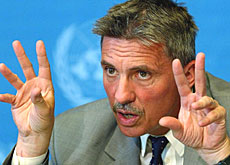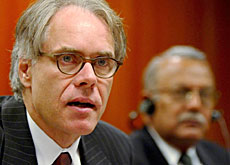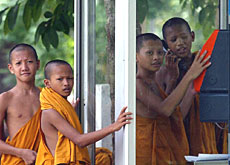Old suspicions die hard
A key aim of the World Summit on the Information Society (WSIS) is to provide universal access to information and communication technologies (ICTs).
Many poorer countries think the rich world should contribute new money to achieve that objective, but the industrialised nations want existing aid to be redirected.
Most African nations are rallying behind Senegal’s proposal to create a solidarity fund that would provide new funding for ICT-related projects in developing countries.
“We would like to see a fund established in Geneva that would be monitored by members of the civil society, governments and the private sector,” a member of the Malian delegation told swissinfo. “It would provide for a check and balance system and you can’t get more transparent than that.”
But the majority of industrialised nations are in favour of creating private sector partnerships and re-directing existing development aid, without channelling it through a new fund.
Control
“Industrialised countries want to make sure that they control where the money goes and that won’t work… Developing countries need to be better integrated into the decision making process as to how the money is spent,” said the Malian official, speaking on condition of anonymity.
Another stumbling block from members of the civil society platform is that their concerns are not being taken seriously by government representatives.
“If governments continue to exclude our principles, we will not lend legitimacy to the final official WSIS documents,” civil society members warned in a statement on Friday.
The civil society platform, which is made up of a wide range of interest groups – from educators and scientists to trade union members and social movements – argues that human rights must form the framework for the information society.
Technocrats
Earlier in the week, they also said they were worried that the meeting was being “overwhelmed by business interests and technocrats.”
According to Wolfgang Kleinwächter, who represents philanthropic institutions to the summit, they are frustrated that not enough emphasis is being placed on issues such as freedom of expression, poverty and justice for the south.
But both Marc Furrer of the Swiss Federal Office for Communication, and the WSIS president, Adama Samassékou, are adamant that many of these concerns must be reflected in the final declaration and action plan.
“For Switzerland, it’s very important that civil society be included and I think we’ve made real progress,” said Furrer. “And when I look at the draft declaration it’s clear that a lot of their principles are included.”
swissinfo, Anna Nelson and Frédéric Burnand in Geneva

In compliance with the JTI standards
More: SWI swissinfo.ch certified by the Journalism Trust Initiative




You can find an overview of ongoing debates with our journalists here . Please join us!
If you want to start a conversation about a topic raised in this article or want to report factual errors, email us at english@swissinfo.ch.